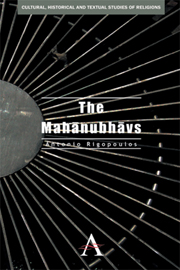Book contents
- Frontmatter
- Contents
- Dedication
- 1 Introduction
- 2 The Early Historical Background and the Mahānubhāvs' Foundational Texts
- 3 The Five Manifestations of the Supreme God Parameśvar
- 4 Elements of Mahānubhāv Doctrine
- 5 Mahānubhāvs' Practice: Devotion and Asceticism
- 6 Mahānubhāvs and Other Religions
- Bibliography
6 - Mahānubhāvs and Other Religions
Published online by Cambridge University Press: 05 May 2012
- Frontmatter
- Contents
- Dedication
- 1 Introduction
- 2 The Early Historical Background and the Mahānubhāvs' Foundational Texts
- 3 The Five Manifestations of the Supreme God Parameśvar
- 4 Elements of Mahānubhāv Doctrine
- 5 Mahānubhāvs' Practice: Devotion and Asceticism
- 6 Mahānubhāvs and Other Religions
- Bibliography
Summary
Scholars have noted similarities between certain aspects of Mahānubhāv theology and practice and other religious systems. For instance, I. Karve observed that, according to some, Mahānubhāvs are nearer to Jain philosophy than to any other form of Hinduism (Karve 1968: 190-191). Brāhmaṇs have often derogatorily linked the sect to other religions, especially Jainism and Islām, encouraging the identification of Mahānubhāvs with these heterodox and hated mlecchas, precisely because of their perceived nonconformity.
In the Yādav period, Jainism was the dominant religion of Karṇāṭak, having its stronghold among merchant and trading castes and receiving an ongoing royal patronage from the various dynasties in power. This is precisely the reason which has led to suggest a Jain influence over Vīraśaivism. At the time of the Yādav King Mahādev, it appears that even one of the royal preceptors was a Jain (one Bhaṭṭārkadev). In the Marāṭhī-speaking area, one of the most important Jain centers was Kolhāpur. Feldhaus has noted that there are partially excavated Jain ruins in Rddhipur and that there are mentions of Jain temples (vasais) in both the LīỊā-caritra and the Sthān-pothī. Though G. B. Sardar has argued that Jains and Mahānubhāvs were never on friendly terms, he cannot fail to notice similarities, especially in the realm of ethics, venturing to suggest that Mahānubhāvs copied their monastic system from the Jains (Sardar 1969: 36-49; 133).
- Type
- Chapter
- Information
- The Mahanubhavs , pp. 87 - 92Publisher: Anthem PressPrint publication year: 2011



